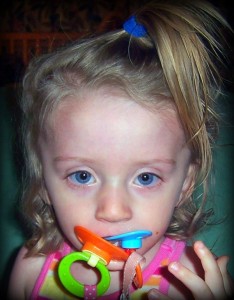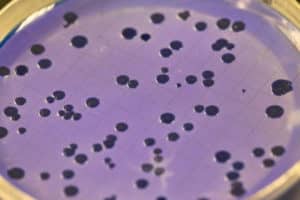Spit Out That Pacifier!
Spit out that pacifier! The drawbacks of pacifiers for your child are numerous.
Little humans have a very strong sucking reflex. It is one of Nature’s ways of keeping them alive. 
Most babies and toddlers use a pacifier at some point in their development. These are considered a ‘transitional object’, and can help little ones make the transition from dependence on parents to independence. Attachment to a blanket, pacifier, slobbery gummed toy, or thumb can be soothing to baby and help her sleep.
For all the emotional good a pacifier does, they have some drawbacks. Pacifiers can drop from little mouths with all the magic of gravity and land near your feet (and places where hundreds of other feet have been). This causes some parents to recoil in horror and attempt to disinfect the offending piece of silicone by licking it ‘clean’. But clean may be the last word you might use to describe this method if you had a microscope handy.
Streptococcus mutans, a bacterium which causes cavities, can be transferred from adult saliva to children’s mouths via the pacifier. These bacteria feed on sugar and produce an acid that eats away at the structure of your child’s teeth. Even if your baby doesn’t eat anything with refined sugar (sucrose), S mutans has cause to celebrate. It can metabolize many forms of sugar, including fructose (the sugar in fruit), glucose (a plant sugar), galactose and lactose (the sugars in milk), as well as sucrose. Simply put, carbohydrates contain sugar molecules, which can be consumed by bacteria and result in cavities.
Think you don’t have this in your mouth? Think again. As soon as you lick your child’s pacifier, share drinking cups or silverware, you have likely succeeded in transmitting it to her.
What is alarming about this is that babies are born with no organisms in their mouths. Everything your baby gets, she gets from caretakers, siblings, playmates, and other humans with eager microorganisms looking for a new host. Studies show that the later your baby acquires S mutans, the less likely she is to get cavities. The goal is to avoid getting these microorganisms from another person as long as possible.
While the risk is greater if the caretaker has poor dental health, i.e. unfilled cavities or gum disease, anyone with harmful bacteria can pass these along to your baby. There is, unfortunately, no way to know by looking at someone if they are a host to harmful oral bacteria.
The mouth is a perfect ‘petri dish’ for the growth of microorganisms. It practically has its own ecosystem. Saliva contains a profusion of bacteria, some of which are beneficial and  some not. It also contains calcium and phosphate ions, which help to re-mineralize the teeth. The balance nature intended is likely that of the simpler, less processed diet our ancestors enjoyed. When we consume sugar of any variety, lactic acid is produced in the mouth, causing a drop in the pH. This creates the acidic environment necessary for tooth decay. Streptococcus mutans thrives in this environment.
some not. It also contains calcium and phosphate ions, which help to re-mineralize the teeth. The balance nature intended is likely that of the simpler, less processed diet our ancestors enjoyed. When we consume sugar of any variety, lactic acid is produced in the mouth, causing a drop in the pH. This creates the acidic environment necessary for tooth decay. Streptococcus mutans thrives in this environment.
Because of this bacterium, dental caries are considered an infectious and transmittable disease. What can a parent do to prevent decay?
· Breast milk is known to be a good immunity builder for your child. When possible, both the American Dental Association and American Academy of Pediatrics agree that breastfeeding will give your child optimum health.
- Resist the urge to share utensils or cups with your child.
- If your child uses a pacifier, have several clean ones available so when one inevitably hits the ground, you have a spare. Or three.
- Monitor your child’s intake of food and drink. Make sure a bedtime bottle contains only water.
- When your baby begins to eat solid food, start encouraging a healthful diet early.
- Brush your baby or toddler’s teeth or wipe her gums with a soft wet washcloth after meals.
- Your baby should have her first dental visit by her first birthday. A Pediatric Dentist is the best choice for this.
The journal of the American Academy of Pediatrics recently published a study about the immunological benefits of adult saliva to babies, to boost bacterial variety and encourage immune response. The American Dental Association responded by reminding parents that the study failed to outline the risks of transmitting bacteria from adult saliva that causes tooth decay.
It is entirely possible to transmit a virus or fungus by essentially sharing saliva with your child. Some bacteria, fungi and viruses can be bad; others can be neutral or even beneficial. At this time, we are in agreement that there is too little information and far too much risk of harmful microorganisms entering your child’s mouth and recommend parents avoid sharing saliva.
Keep your baby or toddler safe and give her a great start to healthy teeth and gums for life! We think the drawbacks of pacifiers for your child are greater than the benefits.
Would you like to read more? Here’s a link to the article discussing the study by the American Academy of Pediatrics regarding ‘cleaning’ pacifiers and immunity: http://pediatrics.aappublications.org/content/early/2013/04/30/peds.2012-3345.abstract
Next month: The Pacifier Wars! What you can do to get your child to give up that thumb or pacifier before it causes problems.













